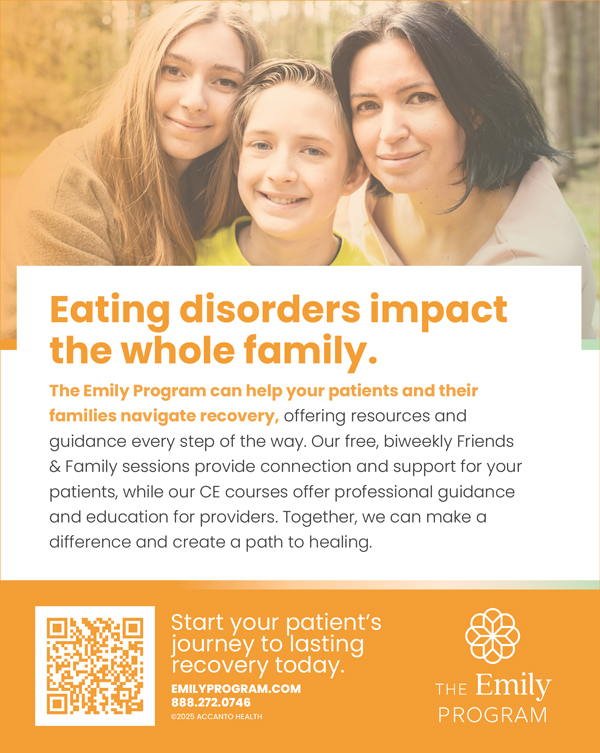For mental health professionals and those invested in behavioral health, understanding the role of family in eating disorder treatment is essential. All eating disorder treatment patients benefit from, and most often require, a personalized and multi-faceted approach to care where clinical interventions lay the foundation for recovery and family involvement provides essential reinforcement. While clinicians provide therapeutic guidance, families serve as a daily source of support and stability.

Eating disorders are complex mental health conditions that require specialized intervention. Before patients themselves, family members may notice changes in their loved one’s eating habits, exercise routines, moods and emotions, or general wellbeing. For some, they may push food around their plate, orient their days or conversations around food/exercise, or avoid eating around others altogether. For family members, these and similar behaviors are often unsettling, and addressing them can feel daunting.
Families may worry about upsetting their loved ones or damaging their relationship. However, familial support, empathy, and guidance are essential in helping them take the necessary steps toward recovery. Families can play a crucial role in helping their loved ones seek out and identify the treatment they need —care that goes beyond what general therapy or primary care can provide. Early intervention is key, as eating disorder behaviors become increasingly entrenched over time, making recovery more difficult. Connecting loved ones with appropriate treatment as soon as concerns arise can lead to better outcomes.
Preparing for the Challenges of Treatment
Beginning treatment can be a complex emotional experience for anyone suffering from an eating disorder. The anticipation of confronting their condition may trigger heightened anxiety, distress, or resistance. Some patients may be angry, fearful, or sad, while others may feel a sense of relief knowing they are finally getting the help they need. All of these emotions are normal.
Family members offer reassurance and stability. Checking in with their loved ones about their emotions and reinforcing the value of treatment can be helpful. The structure of treatment—including therapy, nutritional education and meal planning, medical and psychiatric support, and education for the family —creates a path toward healing.
Providing Support During Treatment
Educating families about eating disorders is an essential first step in fostering a supportive environment. To ensure a successful recovery, a patient’s support system (most often, their family) requires an understanding of the complexities of these illnesses in order to offer informed and compassionate support and avoid any missteps or counterproductivity which might set back treatment and recovery.
It is critical for all family – spouses, siblings, parents, children, caregivers, extended family, etc. – to be mindful of language and behaviors around food, bodies, and even seemingly mundane related subjects like diets, workout trends, or commentary on anyone else’s body (i.e., celebrity weight loss). Everyone – especially family members of eating disorder patients – should avoid commenting on others’ appearance or eating habits, even if the intent is positive. Statements like, “You look so much healthier now,” or “I’m glad you ate all your food,” or anything related to food and/or body can be heard differently than you intended. Instead, parents and caregivers should focus on their overall well-being by expressing sentiments such as, “I’m proud of you” or “I love you no matter what.”
Throughout treatment, patients will face a number of doubts, worries, and concerns that they will rely on their support system to work through. For families, the approach is to address these concerns from a place of love and unconditional support.
A common sentiment in individuals struggling with an eating disorder is “I’m fine.” For many prospective patients, extra support from a loved one is required to take that first step to get help as well as follow through with treatment. For families, it’s important to address the “I’m fine” myth head-on, reassuring their loved ones that seeking treatment does not make them any less capable, strong, or worthy of love. They’ve done nothing “wrong;” rather, they have an illness that requires medical attention.
In times of doubt, when faced with questions about the “right time” to seek treatment, it is critical for families to seek help early and manage concerns about external factors like work or school like they would with any other serious illness.
Finally, it is important that families refrain from comparing their loved one’s recovery to others’ experiences. Each person’s journey is unique, and progress may look different for everyone. They should avoid making assumptions about their child’s recovery based on outward behaviors—checking in with them rather than presuming how they feel is more effective.
When in doubt, just ask. As a family member, you may not have all the answers. Your loved one may not either, but together, a dynamic of open communication and support is possible. The bottom line? Be the person they can say anything to without judgment or shame.
Practical Ways to Support a Child in Treatment
- Encourage specialized treatment from the start. Early intervention is key in eating disorder recovery. Family members can provide the needed support for patients to take the first steps toward recovery and help them navigate the process of seeking out specialized treatment beyond primary care or generalized therapy. Eating disorders require targeted, multidisciplinary care, and the sooner a patient enters an appropriate program, the better their prognosis.
- Help ease their transition. Treatment settings, whether residential, day programming or outpatient, can feel unfamiliar and intimidating. If possible, assist with adjusting to their new routine by providing transportation, visiting, sending supportive messages, or helping assume some of their regular responsibilities like pet or child care.
- Ask what support they need. Regularly checking in can help determine how best to help. Patients may have specific requests that improve their comfort during treatment.
- Work collaboratively with their treatment team. Ensuring alignment with the treatment plan is crucial. Families should communicate with providers, ask questions, and stay informed to maintain consistency in support.
- Offer a listening ear while supporting recovery goals. Recovery is physically and emotionally exhausting. Treatment can feel overwhelming and challenging. Being present and creating a safe space for open dialogue helps individuals feel understood and supported without fear of shame or judgment. Being a strong supporter of ongoing commitment to and participation in care can help manage fears about treatment.
Sustaining Family Support Beyond Treatment
Parents and caregivers often struggle with guilt, wondering if they contributed to the development of the eating disorder. However, the reality is that these conditions are influenced by a range of biological, psychological, and environmental factors. While families are not to blame, their ongoing support is critical in the recovery process.
Prioritizing the family members’ well-being is as important a concern as the patient’s well-being. Supporting a loved one with an eating disorder is often emotionally taxing, and practicing regular self-care enables families to remain strong and steady. Seeking personal support through family groups or therapy can be beneficial, too.
By encouraging education, communication, and a shared commitment to healing, families can play a vital role in helping loved ones overcome eating disorders and reclaim a full, meaningful life.
Dr. Jillian Lampert, PhD, MPH, RD, LD, FAED, is the Vice President of Communications and Brand for Accanto Health, the parent company of The Emily Program and Gather Behavioral Health. She oversees the public affairs, communications, and public relations activities, including cultivating and maintaining industry relations, leading organizational advocacy and policy involvement, supporting public relations highlighting the organization’s role as an industry thought leader, and spearheading availability of key educational content available to the public and external providers.
Dr. Lampert is Co-Founder and President of the REDC, the national consortium representing eating disorders care focused on treatment standards, best practices, access to care, and collaborative research. She is also Treasurer of the Eating Disorders Coalition, a DC-based national organization for eating disorders policy and advocacy, and a Board Member of WithAll, a Minnesota-based organization that empowers eating disorder prevention and strengthens support for recovery. She holds an adjunct graduate faculty position in the Department of Food Science and Nutrition at the University of Minnesota.





